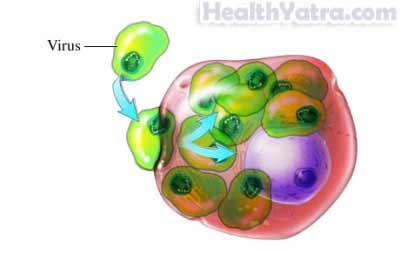Definition
Ebola hemorrhagic fever is a severe infection. It can have a mortality rate of up to 90%. The infection can occur in humans and animals.
Causes
Ebola hemorrhagic fever is caused by the Ebola virus. The virus can pass from person to person through blood or other bodily secretions. When these fluids come in contact with skin or mucus membranes the virus can pass and cause the infection. The virus can also pass through contaminated needles.

Risk Factors
Travel to areas with known Ebola outbreaks increase your risk of Ebola hemorrhagic fever. Almost all cases have occurred in sub-Saharan Africa. No cases have been reported in the US.
Your chance of Ebola hemmorhagic fever also increases with:
- Exposure to healthcare settings that has treated a person with Ebola hemorrhagic.
- Contact with another person who has Ebola hemorrhagic fever.
Symptoms
Symptoms of Ebola may include:
- Fever
- Headache
- Joint and muscle aches
- Sore throat
- Weakness
- Diarrhea
- Vomiting
- Stomach pain
- Rash
- Red eyes
- Hiccups
- Internal and external bleeding
If you have any of these do not assume it is due to Ebola. These symptoms may be caused by other, less serious health conditions.
Diagnosis
Your doctor will ask about your symptoms and medical history. A physical exam will be done. If you may have been exposed to the virus and have symptoms and to the virus, your doctor will notify health officials. This will include the local health department and the Centers for Disease Control and Prevention (CDC).
To confirm the presence of the virus your doctor may order blood tests. These tests will help identify the virus itself and antibodies to the virus. Antibodies are signs that your body has identified and is fighting the virus.
Treatment
There is no cure. You will be isolated to prevent the spread of the disease.
Treatment is focused on supporting you while your body fights the infection. Treatment may include:
- IV fluids and electrolytes
- Oxygen and blood pressure support
- Treatment for any complicating infections
Prevention
To help reduce your chance of getting Ebola hemorrhagic fever, take the following steps:
- Avoid traveling to an area that is experiencing an outbreak.
- If you are a healthcare worker, wear protective clothing. This includes masks, gloves, gowns, and goggles.
- Avoid reusing needles.
- Avoid contact with anyone who may have been exposed to the Ebola virus.
Keywords :
Ebola Hemorrhagic Fever Definition, Ebola Hemorrhagic Fever Causes, Ebola Hemorrhagic Fever Symptoms, Ebola Hemorrhagic Fever Complications, Ebola Hemorrhagic Fever Surgery Cost in India, Ebola Hemorrhagic Fever Treatment Hospital in India, Ebola Hemorrhagic Fever Treatment in India, Ebola Hemorrhagic Fever Doctors in India, Ebola Hemorrhagic Fever Meaning in Hindi, Ebola Hemorrhagic Fever Meaning in Bengali, Ebola Hemorrhagic Fever Meaning in Arabic, Ebola Hemorrhagic Fever Treatment cost in 2024, Ebola Hemorrhagic Fever Hospital in India, Ebola Hemorrhagic Fever Treatment Near Me, ebola symptoms, ebola treatments, what is ebola, ebola prevention, how many people died from ebola, ebola virus history, how do you get ebola, prevention and control of ebola virus disease pdf,
